Cat Owner Got Upset When A Colleague Said Her "Fur Babies" Are Not Really Kids And That's Why Moms Don't Invite Her To Their Events
Your friends intentionally leaving you out of activities and parties is one of the worst feelings in the world. It can make you question your relationship with them and your value in their lives.
It's an awful feeling when your only choices are to continue being friends with them or distance yourself from people who hold you in such low regard. Nevertheless, the feeling of being the odd one out will stay with you for a while.
This 20-year-old employee posted on Reddit about his coworker who was treated that way. OP recently started a new job in a female-dominated workplace.
There is a small group of women who have bonded because of their experiences as moms. They all have children who are roughly around the same age.
It's typical for the group to meet for mom-and-kids activities, have coffee, get together on weekends, and even be each other's babysitters. One of OP's coworkers has been complaining to him about being left out by this group.
She feels they are excluding her on purpose, and OP sympathized with her. He thought she had kids of her own since she refers to herself as a "mama" and talks about "the kids" frequently.
On one Friday, OP asked to see pictures of her kids, and he was surprised when she showed him a photo of three cats. OP finally realized that she's a "fur mama" with "fur babies."
OP understood how she feels about her cats because he loves his own pets as well, but he thought it was weird that she was hurt over being left out by the mom group

Their activities involve actual human children, and this coworker has none
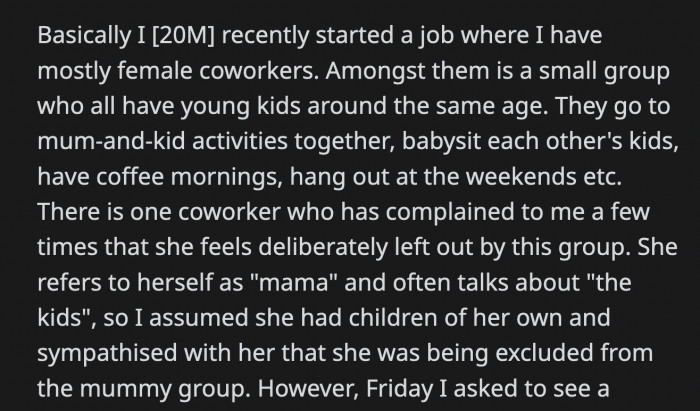
When she complained again, OP gently said that maybe they are excluding her because they hang out with their kids, and in that context, fur babies do not count
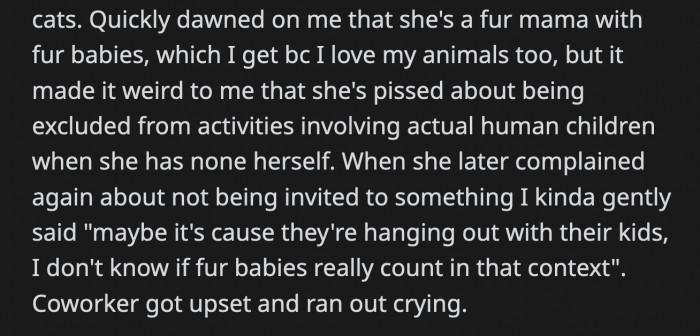
Defining Emotional Attachments
This situation brings to light the emotional complexities of pet ownership and the varying degrees of attachment individuals feel. Dr. Rebecca Moore, an animal behaviorist, explains that pet owners often perceive their animals as family members, leading to strong emotional bonds. This perspective can create friction when others do not share the same view.
Research in psychology has shown that people can experience profound grief and loss when their pets are not recognized as significant family members, which can lead to feelings of isolation and misunderstanding. In essence, the emotional stakes in this discussion are quite high.
Understanding Emotional Investment in Pets
The emotional investment people place in their pets can often lead to strong reactions when they feel those investments are invalidated. Research by Dr. Julie Hecht, an animal behavior researcher, emphasizes that pet owners often view their animals as family members, which can lead to heightened emotional responses when their parenting choices are questioned. This phenomenon is particularly relevant in this case, where the cat owner feels her identity as a pet parent is being challenged.
Such dynamics can create rifts in social interactions, especially if others don't understand the depth of this bond.
When OP made his comment, he didn't know she was infertile, and taking care of cats is how she copes. Is OP an a**hole for making such comments?

Someone pointed out that every person in this story behaved terribly — OP for saying something insensitive, the mommy group for excluding the coworker, and OP's colleague for expecting people to treat her cats the same as their kids
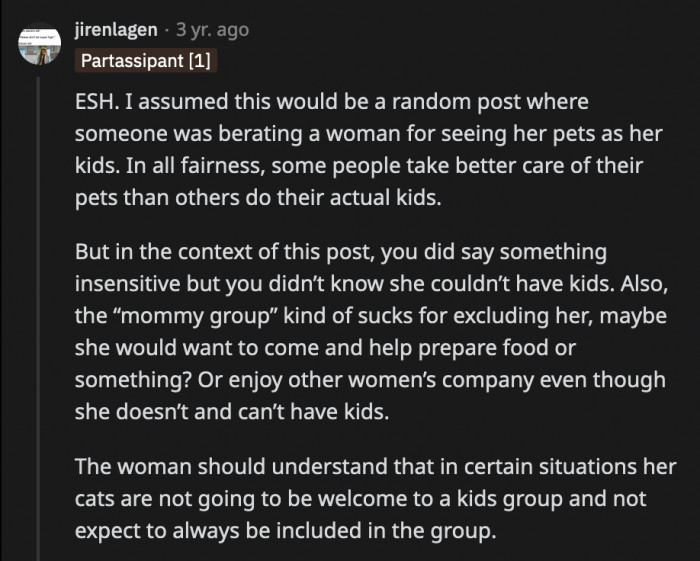
OP says the mommy group, even when they're not excluding their colleague, are not a nice group of people

Moreover, the concept of social identity plays a crucial role in how individuals perceive their relationships with pets. According to studies published in the Journal of Social Psychology, individuals often derive part of their identity from their roles as pet owners. When someone dismisses this identity, it can feel like a personal affront, intensifying feelings of rejection and grief.
In this case, the colleague's comment may have inadvertently dismissed the cat owner's emotional experience, leading to defensiveness and conflict.
Psychological research indicates that people often anthropomorphize their pets, attributing human-like qualities and emotions to them. According to a study in the Journal of Personality and Social Psychology, this tendency can enhance the emotional bond between pet owners and their animals, leading to strong feelings of loyalty and protection. In this case, the cat owner may feel defensive about her choice to refer to her pets as 'fur babies' because it reflects her identity and values.
In conclusion, the members of the exclusive mom group are the real a-holes here; it just didn't help that OP drove the point home
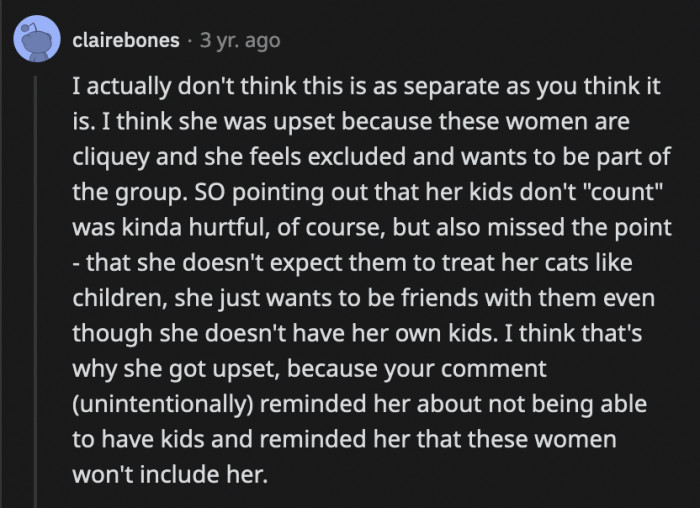
OP may technically be right, but what he said still hurt her feelings. He can and should apologize.
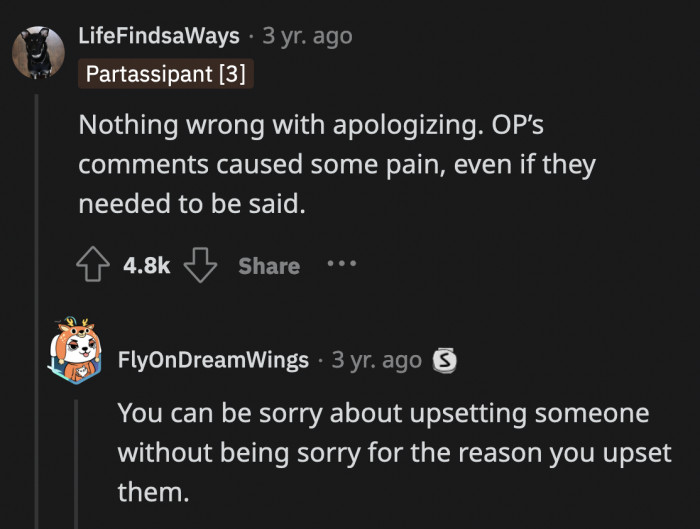
In actuality, there are no real a**holes in this story
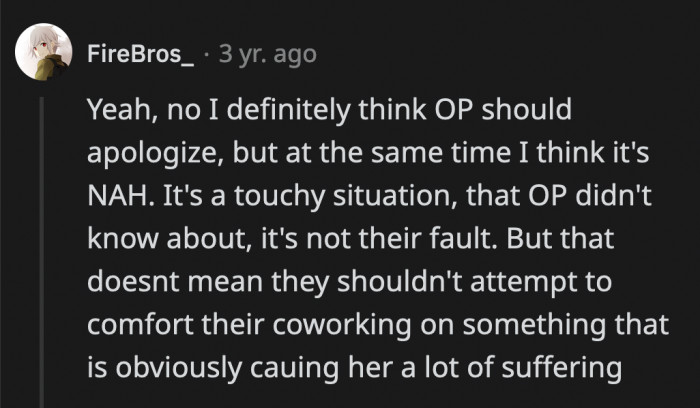
Navigating the Landscape of Friendship
Friendship dynamics can become complicated when there are differing views on significant topics such as pets. Dr. Samuel Black, a social psychologist, highlights that misunderstandings can arise when individuals fail to recognize the importance of another’s emotional connections. Approaching such differences with empathy and curiosity can foster healthier discussions.
For instance, the cat owner could express how her pet contributes to her emotional well-being and ask her colleague about their perspective, creating a space for mutual understanding.
The Impact of Social Norms on Identity
Social norms significantly influence how individuals perceive their relationships with pets. As Dr. Linda F. H. Wong from Stanford University notes, societal expectations often dictate what constitutes a 'real' family, which can marginalize those who view their pets as children. This marginalization can foster feelings of isolation among pet owners who may already feel misunderstood in their choices.
Understanding these societal pressures is vital for creating a more inclusive environment for all types of families.
It's also important for OP to apologize sincerely, not only because he hurt his coworker's feelings, but he also has to work with her. Their conflict can cause unnecessary tension in their professional relationship.
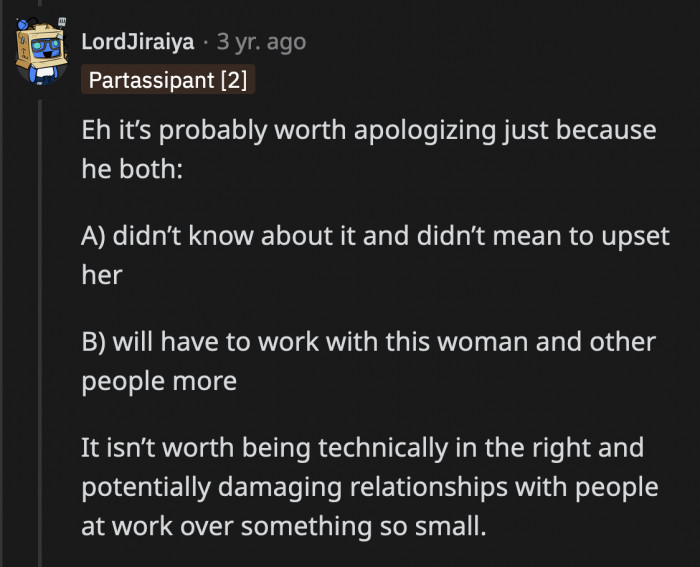
Wanting to be included at coffee meets does not make OP's colleague an a**hole, but she also shouldn't expect others to regard her cats as children like she does
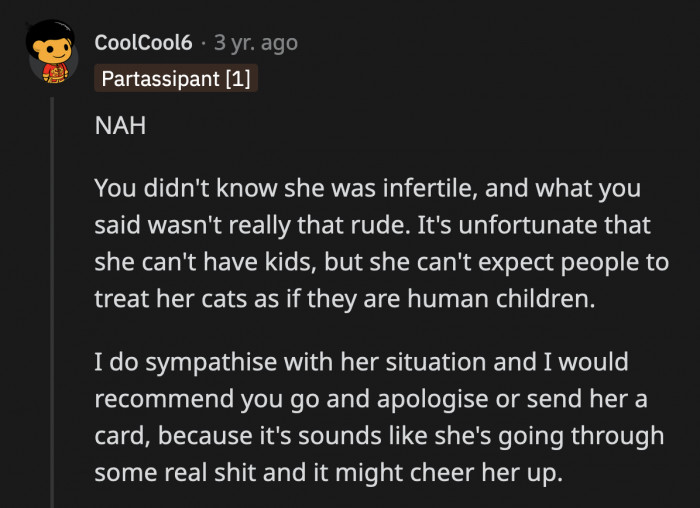
What OP said was unkind, but he didn't know she can't have kids. He is right to feel guilty, but he is not a complete jerk.
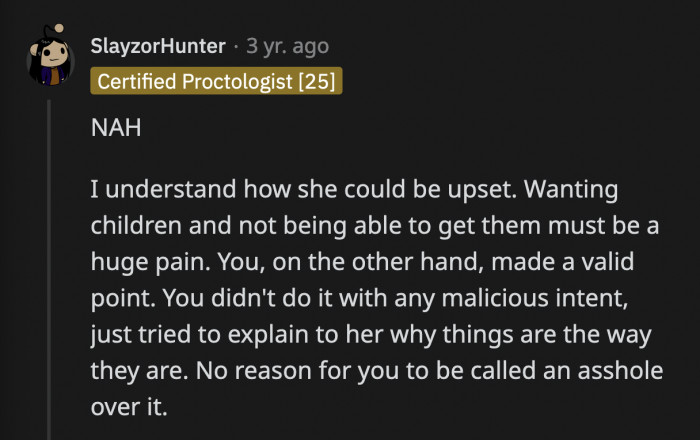
Empathy and Communication
Empathy is a crucial component in resolving conflicts over differing values. A clinical psychologist emphasizes that expressing one’s feelings can facilitate understanding between friends. The cat owner might benefit from sharing her attachment to her pet and what it means to her, rather than reacting defensively.
Studies have shown that when individuals share personal narratives, it can create emotional connections and foster understanding, helping to bridge the gap between differing perspectives.
To foster a more accepting dialogue around pet ownership, individuals can focus on building empathy and understanding among different viewpoints. One practical approach is initiating conversations that celebrate diverse family structures, including those that involve pets as integral members. Research indicates that sharing personal stories about pet ownership can reduce stigma and foster connection among individuals with differing beliefs.
While his coworker wants to feel included, it doesn't mean she will bring her cats to the activities, like what the other Redditors said
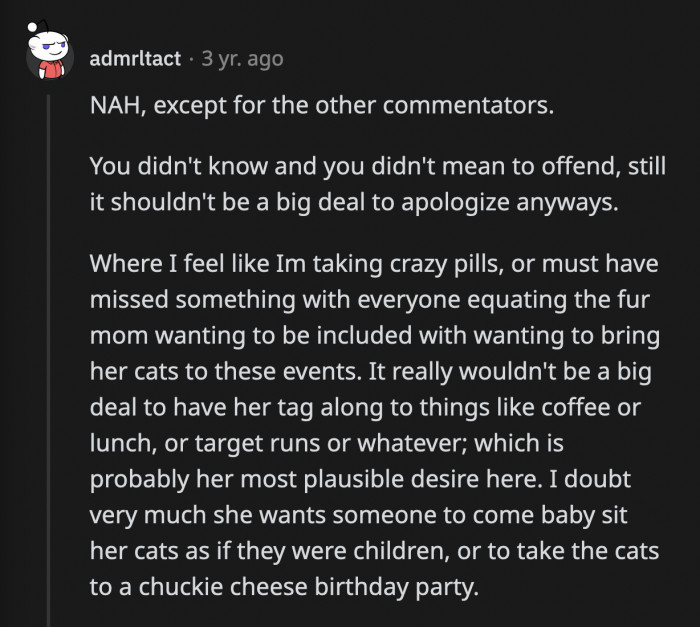
She can still be a part of the group even though she has no kids of her own; it shouldn't make her a complete outcast
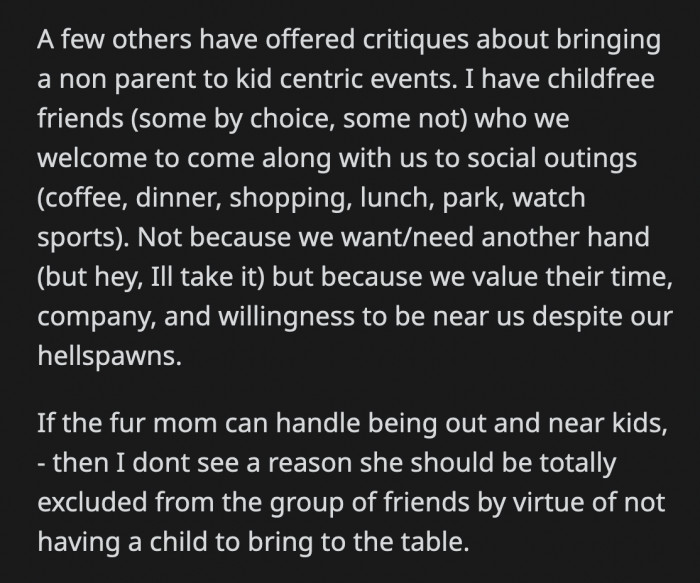
OP should do the kind thing and apologize to her

The Importance of Boundaries
Establishing personal boundaries is essential for maintaining healthy relationships. A family therapist advises that the cat owner should communicate her feelings about her pet being dismissed in a way that is assertive yet respectful. This approach can help set boundaries without alienating the colleague.
Research indicates that healthy boundaries contribute to stronger, more resilient friendships, as they allow individuals to express their needs and feelings without fear of judgment.
Creating Inclusive Communities
Building inclusive communities involves recognizing and valuing the different ways people define family. According to Dr. Jennifer Brown, a sociologist specializing in family dynamics, acknowledging the emotional and psychological bonds that people form with their pets can help create a more accepting and supportive environment. In this case, encouraging gatherings that include pet owners can foster community and promote understanding across diverse family structures.
Inclusive spaces allow individuals to express their identities without fear of judgment, ultimately leading to stronger community ties.
OP took that advice, and while the tension isn't completely gone, she at least knows OP didn't mean to hurt her feelings

It was a complicated situation that involved a lot of complex feelings. OP didn't mean any malice when he explained why the mom group does not invite her to their gatherings.
Wanting to belong to a friend group does not make her an a**hole, but being hurt by what OP said is valid, too. OP did the right thing by apologizing, and he can continue rebuilding their friendship once again.
Ultimately, fostering understanding among differing viewpoints requires open-mindedness and empathy. Engaging in community-building activities that celebrate different kinds of families can help break down barriers and promote acceptance. Research supports the idea that communities thrive when all members feel valued and understood, thus enhancing social cohesion.
Psychological Analysis
This situation illustrates the conflict that can arise when personal identities intersect with societal expectations. It's essential for individuals to navigate these conversations with empathy, recognizing that pet ownership can represent a significant aspect of someone's identity. Fostering acceptance and understanding is key to building more inclusive social environments.
Analysis generated by AI
Analysis & Alternative Approaches
In summary, the emotional bonds people share with their pets often challenge societal norms and expectations. Research consistently emphasizes the importance of inclusivity and understanding in fostering healthy interactions among individuals with differing views on family structures. By encouraging open dialogue and celebrating diverse relationships, communities can become more supportive and cohesive.
Finally, considering the broader implications of these conflicts is essential. Research in emotional intelligence suggests that unresolved conflicts can lead to increased stress and tension in relationships. When individuals feel misunderstood, it can create a cycle of defensiveness that hinders healthy communication.
Addressing disagreements openly and empathetically can promote emotional well-being and strengthen the bonds of friendship over time.
Analysis & Alternative Approaches
In conclusion, navigating the complexities of emotional attachments in friendships requires empathy, communication, and the establishment of healthy boundaries. Recognizing the emotional significance of pets and creating space for mutual understanding can help resolve conflicts and strengthen relationships. Through open dialogue, friends can foster a supportive environment that respects each other's values and experiences.



